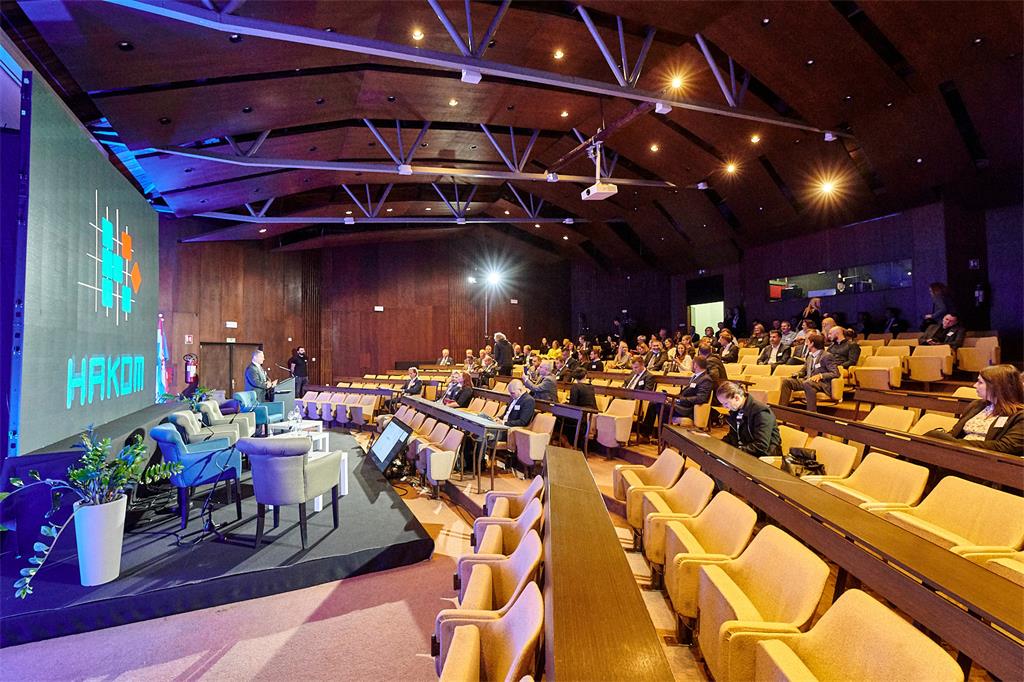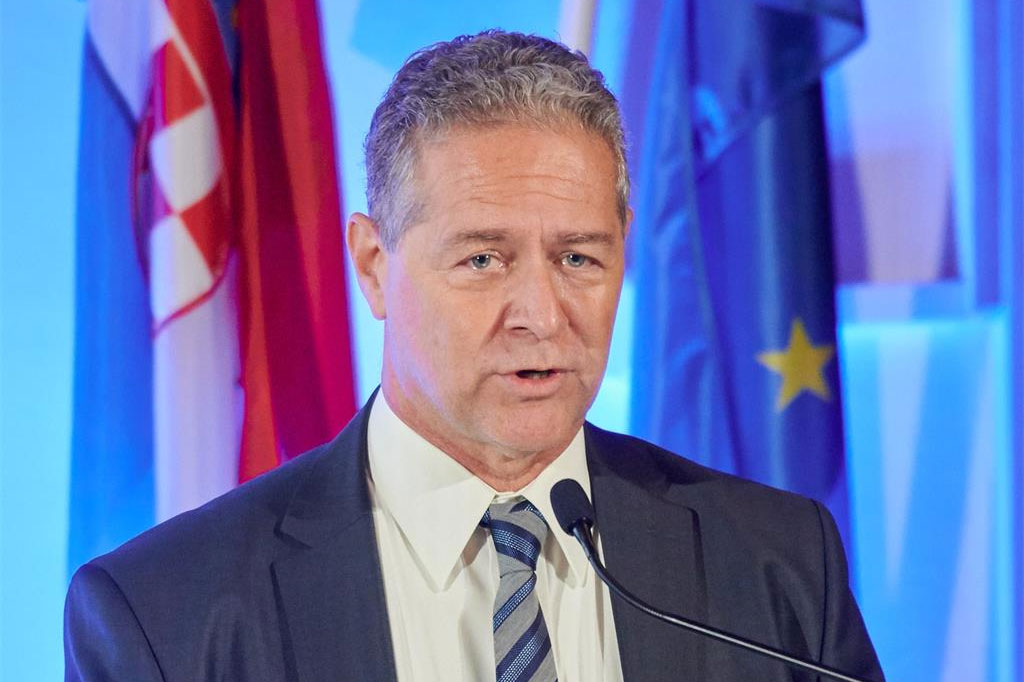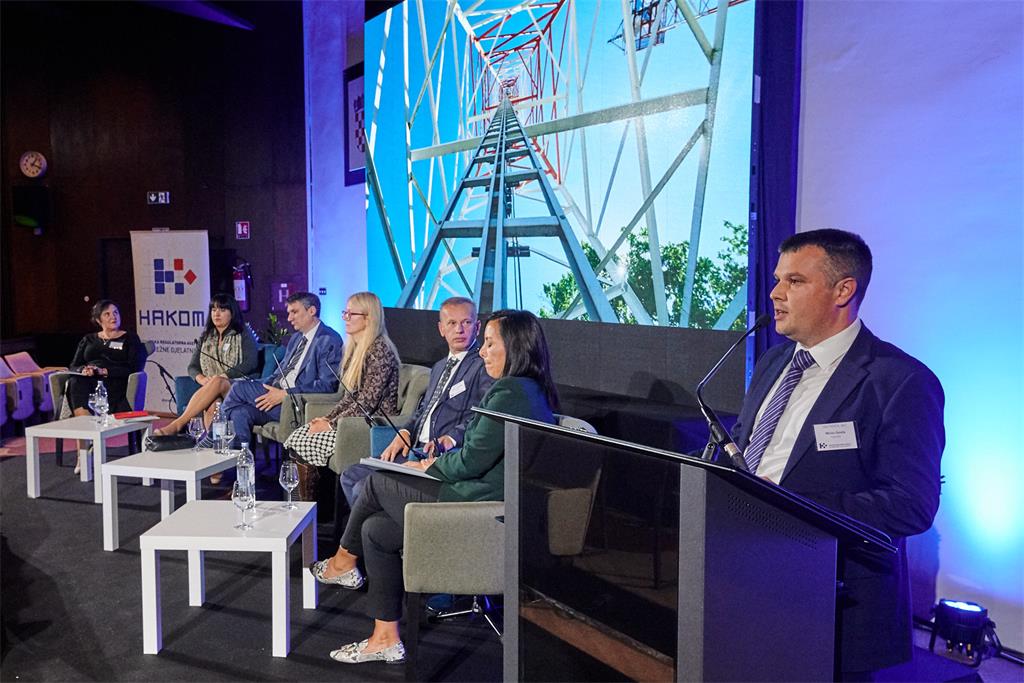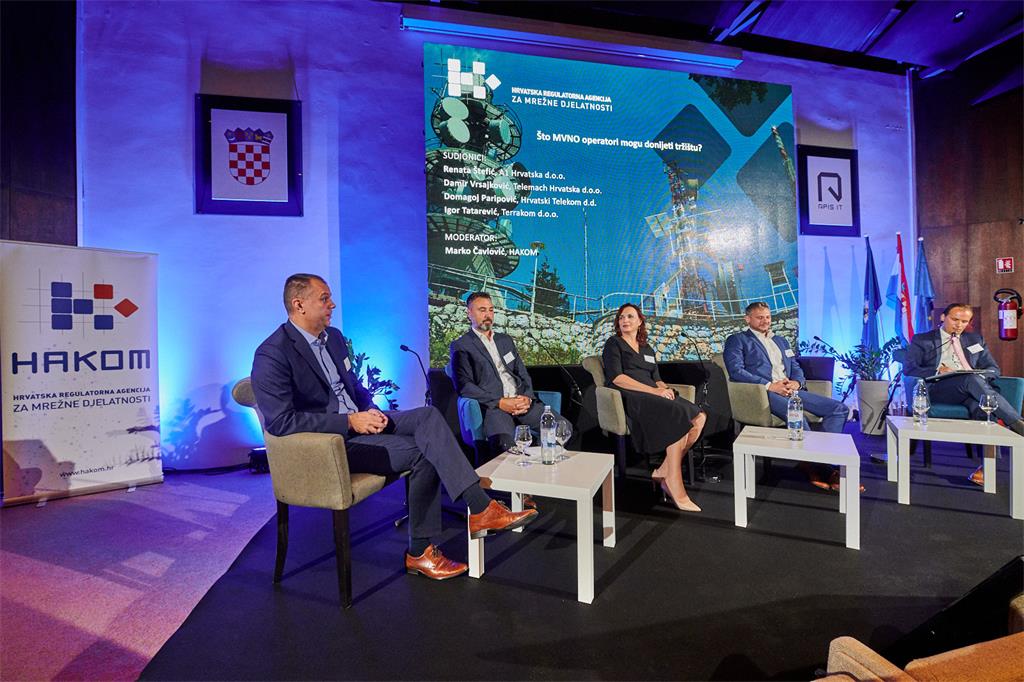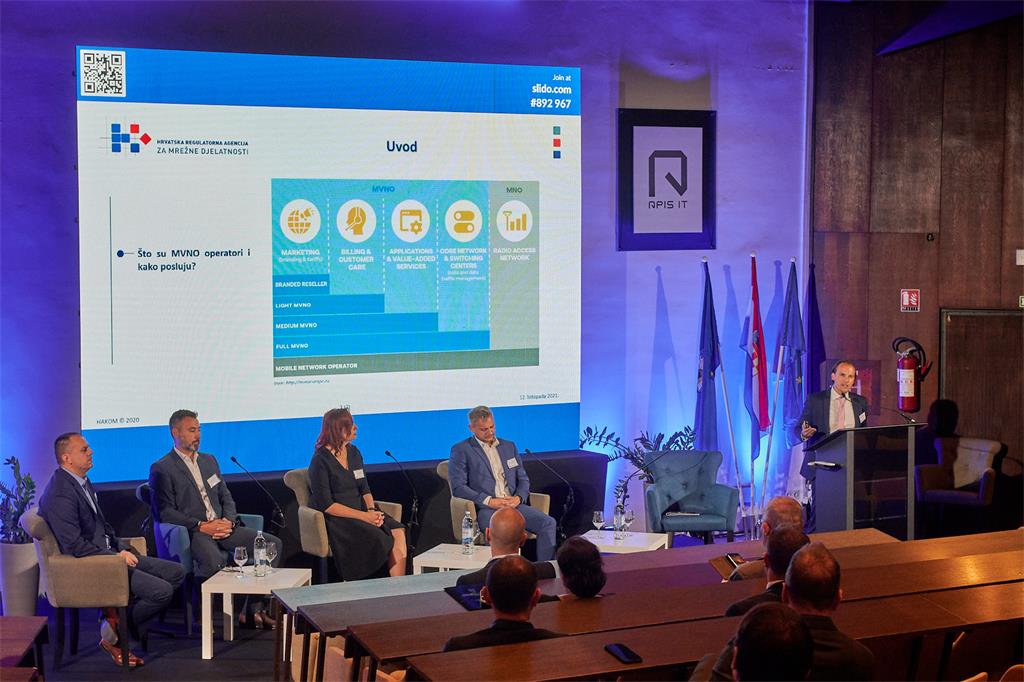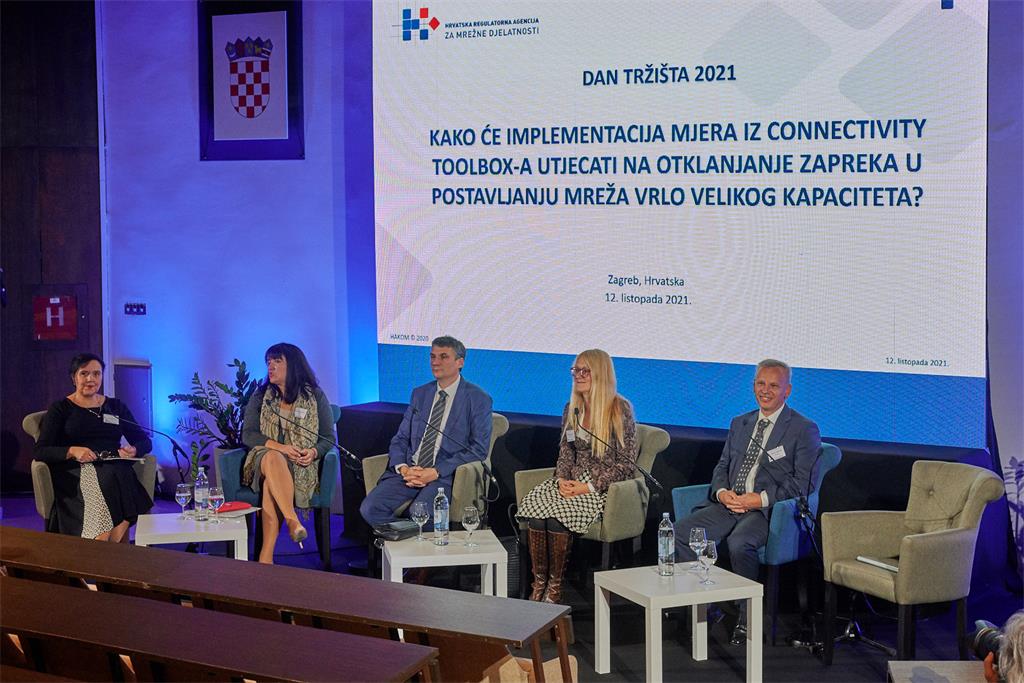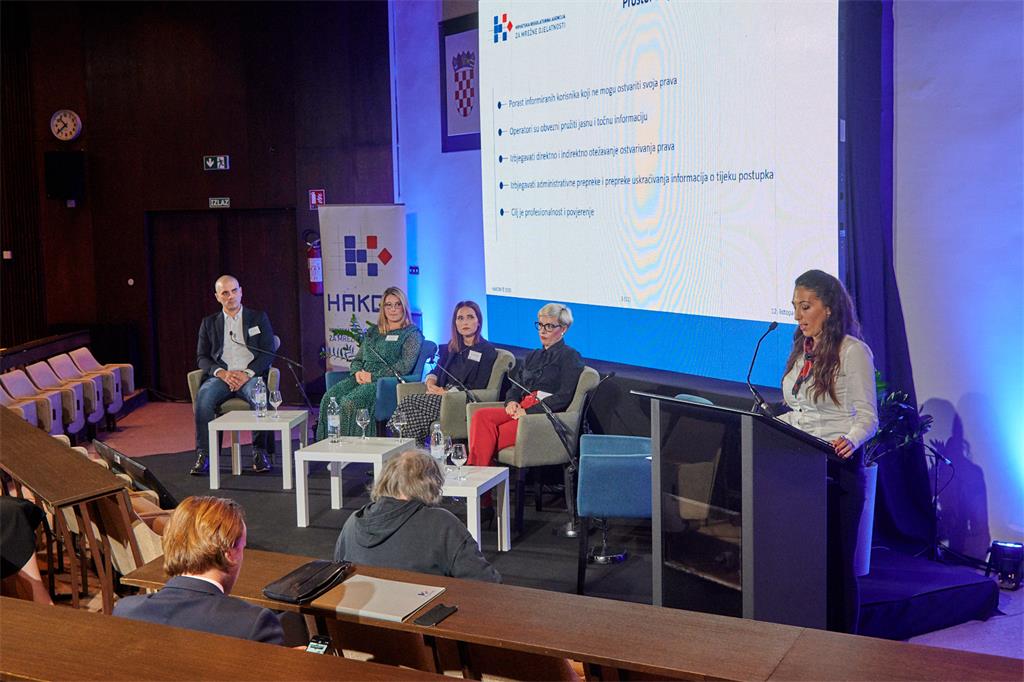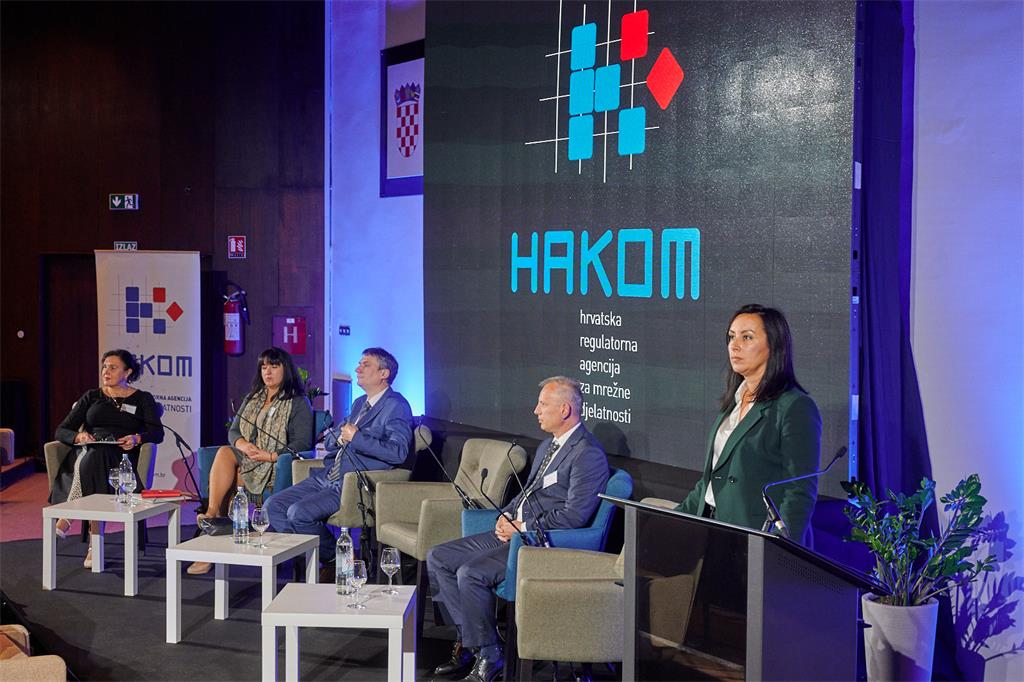The 8th HAKOM’s Market Day
ZAGREB, 12. October 2021 - Traditional, eighth- HAKOM’s Market Day was held on Tuesday 12, October in Zagreb, bringing together representatives of operators, economy and consumer associations and regulators who tried to find answers to some of the inquiries during the three panel discussions. In his welcome speech, Tonko Obuljen the Chairman of the Board at HAKOM reflected on the previous period marked by pandemics and earthquakes, which neither did significantly affect networks nor did harm the rapid traffic growth, providing a more flexible approach towards the users. HAKOM, as market regulator, temporarily postponed the switch to DVB-T2, and the public auction procedure was postponed regarding the allocation of 5G radio spectrum, but it was both successfully completed. Following the public auction, new regional operators were present on the market, which should contribute to market development, the Chairman of the Board expressed the satisfaction with the arrival of the third operator on the market of immobile communications, as well as the change in the market structure of Telemach and expressed his expectations that all this would result in benefits, for both, the market and users of the service. Among other activities, he pointed out the finalised methodology of margin squeeze text as the basic regulatory tool for monitoring the market. HAKOM has participated in the Connectivity Toolbox Working Group, EIO has established a working group to deal with its implementation. In July, the period ended in which Optima was a part of the HT Group. The realization of sales of Optima is expected as well DAB + licenses. Obuljen said that we should expect the implementation of the European Electronic Communications Law is awaiting us, for which HAKOM is prepared.
He also noted that the existing licenses for radio spectrum expire in 2024, which will lead to a new auction earlier. HAKOM expects activities related to new market analyses, which will be conditioned by changes after the exit of Optima from HT Group, and geographic segmentation of the market will have to be considered. Networks are also expected to be built with the EU grants, controlled by HAKOM. Connectivity Toolbox will often be mentioned in the coming period because connectivity is the basis for many EU plans, and in the Republic of Croatia we will face challenges in building networks, building and managing infrastructure, Obuljen announced.
Three panel discussions
Panel discussion on “What can MVNO operators bring to the market?” has crystallized most of the emerging issues related to the business models of the MVNO operator, practices in the EU Member States, the situation on the market of the Republic of Croatia as well as certain market indicators. At the panel discussion, moderated by Marko Čavlović from HAKOM, Renata Štefić from A1 Croatia, Damir Vrsajković from Telemach, Domagoj Paripović from HT and Igor Tatarević from Terrakom presented their opinions.
Mobile virtual communications network operators work through four business models, but they share the fact that they do not own a radio part of the network, but have to negotiate with mobile network operators in order to lease the network. By means of the licenses that the operators purchased through the spectrum, HAKOM gave an access obligation to the MVNO. That access is not only limited to t the virtual operators. Moreover, the existing operators can become such operators. Giving the access was imagined by HAKOM as negotiation concept in good faith.
Renata Štefić (A1) said they had some inquiries so far, but they were more informative, and Domagoj Paripovć (HT) confirmed that they too had some discussions regarding commercial use but nothing had been realised so far. Damir Vrsajković (Telemach) stressed that there were a number of operators on the EU market who have found a fairly successful business model. However, a small market can be considered as aggravating circumstances in the Republic of Croatia, 20 percent of the shares held by B brands on the market, while at the same time there are three strong infrastructure operators in the market that are in the process of strong investments in 5G network. Igor Tatarević (Terrakom) stressed that Terrakom sought a mobile virtual network offer from all three operators, but received negative answers or did not receive them at all. He believes that the problem is the lack of price lists, i.e. the lack of standard offers for all four models, which should be in the interest of the regulator.
How can operators facilitate the end-users?
“Can the operators simplify the exercise of their subscribers’ contract rights to users?” It was the subject of a panel discussion by Magdalena Peh Resman (A1), Iva Cibulić Blažević (HT), Iva Dragić (Optima) and Sladjan Miličević (Telemach), and the discussion was moderated by Marina Ljubić Karanović (HAKOM). On this occasion, it was pointed out that HAKOM had noticed space for improvement in some areas of protection of end-users’ rights. Concrete and quality information is obtained through daily communication with users, but also through their inquiries arriving through different channels and through complaints submitted by users to HAKOM. Users are informed and know what they need, but they run into walls when trying to exercise their rights with the operator. Namely, the user knows his rights, but the operator refers him to some additional actions that lead to the termination of proceedings due to administrative obstacles, excessive identification, documentation, paperwork, circling, and correspondence with the customer service for months. The representatives of the operators presented their experiences, and in principle the conclusion is that all procedures have to be simplified, so that users are less burdened by administrative barriers. The objective of HAKOM, as stated on this occasion, is not to prescribe absolutely everything, but to encourage operators to use their own-initiative examples of good practice, i.e. as much as possible good self-regulation.
“How will implementation of Connectivity Toolbox affect the removal of obstacles in setting up very high capacity networks?” It was the topic of the latest panel discussion by Ivančica Urh from the Ministry of the Sea, Transport and infrastructure, Katarina Đurđenić from the Ministry of Physical Planning, Construction and State Property, Nikola Vučić from the State Geodetic Administration and Martina Dragičević from the Croatian Employers' Association, Stjepan Vodolšak (HAKOM), and the moderator of the panel discussion was Kristina Čosić (HAKOM). During the discussion, it was pointed out that many measures have already been incorporated into strategic and planning documents and that their implementation, as well as the collection of experience, is now under way. These measures will have a positive impact to the extent that they will live in practice. It is a comprehensive set of measures, and how much understanding and synergy of stakeholders will come to life in practice.
In his closing speech, Miran Gosta, the Executive Director at HAKOM, referred to future plans for the development and activities of HAKOM and announced a new strategic paper that will soon be published.
"In HAKOM we are devoted to the needs of modern society, by providing the quality regulation. Our goals are to promote the end-users’ interests, investments and development of the single EU market, as well as business excellence. Over the past years, we have changed the way we work, we promote open communication, which is why the market recognises HAKOM as a reliable partner," Gosta said.
For additional information please contact:
Croatian Regulatory Authority for Network Industries (HAKOM)
- Roberta Frangeša-Mihanovića 9 Street
- 10110 Zagreb, Croatia
- Tel. + 385 (0) 1 700 70 07
- Fax + 385 (0)1 700 70 70
Media inquiries can be submitted online using HAKOM’s official website: www.hakom.hr
About Hakom
HAKOM - Croatian Regulatory Authority for Network Industries – ensures preconditions for a fair market competition, stable growth and environment for innovations in the electronic communications and postal services market. HAKOM protects users’ interests and the possibility of choice among various communications and postal services at affordable prices, defines sustainable competitive conditions for operators and service providers under fair conditions for return on investment, and provides support to economic growth, public services and the quality of life in the Republic of Croatia by using modern technologies. HAKOM’ strategic goals are: to promote regulation of the electronic communications and postal services market, to support growth of investments and innovations in the electronic communications and postal services market, to provide efficient use of limited resources, to accelerate the growth of broadband products and services, to provide affordable offers of communications and postal services, to provide protection and informing of users, to build an efficient and comprehensive information system, to define and implement efficient processes, and to acquire multi-disciplinary expertise in market regulation.

